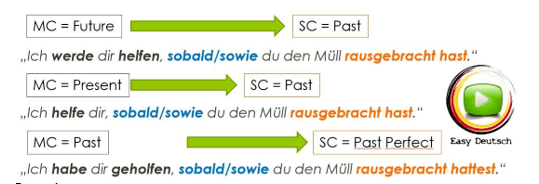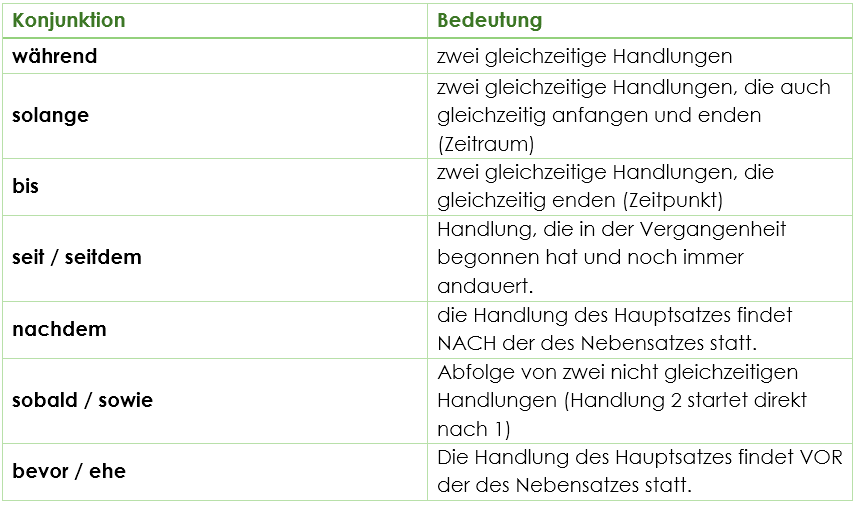What are Temporal Clauses? (Temporalsätze)
Temporal clauses (Temporalsätze) are subordinate clauses (Nebensätze) that give information about time: when something started, how long it will last, etc.
They always begin with a temporal conjunction - there are quite a few, and each has a different meaning.
The Temporal Conjunctions (Temporale Konjunktionen)
„Seit / Seitdem“
Meaning: "seit" expresses when something started (only use when it's still going on).
- „Ich lerne Deutsch, seitdem ich in Deutschland wohne.“
→ Both actions / conditions began at the same time and are not finished yet (we use the German simple present - Präsens - for both). - „Seitdem ich einen Unfall hatte, sitze ich im Rollstuhl.“
→ The action in the subordinate clause happened in the past and (we use the simple past). The action in the main clause is still going on (we use the Präsens).
„bis“
Meaning: „Bis“ expresses when something will end.
- „Ich bleibe hier, bis ich mit meiner Arbeit fertig bin.“
- „Bis du mit der Arbeit fertig bist, sehe ich ein bisschen fern.“
- „Ich warte hier auf dich, bis du wieder zurück kommst.“
„während“
Meaning: „Während“ expresses that things are going on at the same time.
- „Ich gehe einkaufen, während du die Wohnung aufräumst.“
- „Während du Computer spielst, lerne ich.“
„solange“
Meaning: „Solange“ expresses that an action will continue as long as another action continues to occur.
- „Ich werde putzen, solange ihr eure Hausaufgaben macht.“
- „Solange du bei mir bist, habe ich keine Angst.“
„nachdem“
Meaning: „Nachdem“ expresses that one thing happened after another (the events of the subordinate clause happen first, then the main clause).

Example:

Recommendation: Tenses
If you are still not sure about the formation and use of each Tense, I recommend the following lessons: Present Tense (Präsens), Perfect Tense (Perfekt), Past Tense (Präteritum), Past Perfect Tense (Plusquamperfekt), Future 1, Future 2.
„bevor“ / „ehe“
Meaning: „Bevor“/„ehe“ expresses that one thing happens before another (the events of the main clause happen first, then those of the subordinate clause).
- „Ich putze Zähne, bevor/ehe ich schlafen gehe.“
- „Bevor/ehe du dich setzt, machst du deine Hausaufgaben.“
„Bevor“ is used much more often than „ehe“.
„Bevor“ and „ehe“ are opposites of „nachdem“.
„Sobald/sowie“
Meaning: „Sobald“ and „sowie“ express that something (the main clause) happens right after something else (the subordinate clause).
In order to make sense, we put the subordinate clause one temporal stage (one tense) before that of the main clause.

Example:

Difference between „sobald“ / „sowie“ and „nachdem“:
When you use „sobald“, „sowie“ the second action happens directly after the first action is completed. With „nachdem“ it just happens at some point after the first action is completed.
Recommendation: „als“ or „wenn“?
There are two other conjunctions that introduce temporal clauses: „als“ and „wenn“. Since many students and even native speakers often make mistakes when using them, I have created a separate lesson on this: „als“ or „wenn“?
Summary - Temporalsätze
The Temporal Conjunctions

Gramato: Your German Grammar Coach
Try Gramato now!
Powered by EasyDeutsch AI

This is how Gramato can help you!
Gramato helps you with all your German grammar questions – fast, to the point, and always based on the trusted content from https://easy-deutsch.com.
Gramato offers fill-in-the-blank exercises on a variety of grammar topics, tailored to your level so you can practice exactly what you need.
Get answers in multiple languages – German, English, Spanish, French, and more. That way, you can understand grammar in the language you feel most comfortable with.
Clear and simple grammar explanations – so you can learn faster and smarter with Gramato.
Ask your questions or practice anytime with Gramato – no wait, just results!
Related Topics:
Temporal Konjunktionen are subordinate clauses. Subordinate clauses are introduced by the following Unterordnende Konjunktionen (Subordinating Conjunctions):
- „dass“- Ergänzungen (Contemplementary Clauses)
- „weil/da“- Kausalsätze (Causal Clauses)
- „obwohl“- Konzessivsätze (Concessive Clauses)
- „damit“- Finalsätze (Final Clauses)
- „wenn/falls“- Konditionalsätze (Conditional Clauses)
- „so dass“- Konsekutivsätze (Consecutive Clauses)
- „indem“- Modalsätze (Modal Clauses)
- „als/wenn“- Temporalsätze (Temporal Clauses)
Subordinate Clauses include:
- Indirekte Fragen (Indirect Questions)
- Relativsätze (Relative Clauses)
- Infinitiv mit zu (Infinitive Clauses)
- „um/ohne/anstatt... zu...“-Infinitivkonstruktionen (Infinitive Construction)
More information on Sentence Structure and Word order: Satzbau
You can find an overview of all topics under German Grammar.
Recommendation: Free video lessons every Tuesday & Thursday
Sign up now: Email German Grammar course


